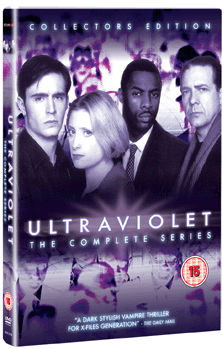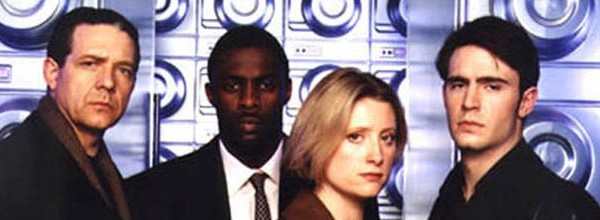Not that you will hear that term anywhere within these six episodes as, exorcising much of the supernatural, the bloodsuckers are referred to parasites, leeches or ‘code fives’, represented by the roman numeral V. The vampire phenomenon presents in the terms of a public health issue with a grim future painted for humanity if they seize control.
Channel 4’s 1998 series Ultraviolet is set predominately in London, with lots of moody late night filming. Starting out like a police procedural, Michael Colefield (Jack Davenport) is a police detective who becomes drawn into the vampire world when his colleague and best friend Jack (True Blood‘s Stephen Moyer) goes missing, failing to turn up for his own wedding.
Joining the shadowy vampire hunting squad, Michael discovers the rules of vampirism, which have undergone a modern twist. Not only are they unable to be seen in mirrors, but they cannot be captured on video or film either, nor can their voices be recorded ruling out use of the telephone.
As well as the rules, the weaponry with which to fight them receives an ‘anti-gothic’, scientific twist too. They employ carbon bullets in place of wooden stakes and garlic gas grenades.
 The titular ultraviolet is the active ingredient in daylight to which the vampires are allergic and the method by which vampire bites are revealed, as they remain naked to the human eye. They remain ambiguous on the subject of religion and faith, suggesting that such things are subjective and vampires are superstitious too. Effects are mainly practical, but the show does utilise some early CGI for the vampire explosions which holds up well.
The titular ultraviolet is the active ingredient in daylight to which the vampires are allergic and the method by which vampire bites are revealed, as they remain naked to the human eye. They remain ambiguous on the subject of religion and faith, suggesting that such things are subjective and vampires are superstitious too. Effects are mainly practical, but the show does utilise some early CGI for the vampire explosions which holds up well.
The moral dilemma of fighting vampires is constantly tackled with the squad is described as a latter day equivalent of the Inquisition and also referred to as a death squad. They dispense summary justice on the bloodsuckers exercising powers that appear to allow them to overrule the regular police. Though never fully explained, there is an implication that they are state funded and have connection in very high places.
There are other moral issues within the show too, which tackles subjects including abortion and paedophilia. Being above the law, the team go beyond regular constraints with violent interrogation on occasion, and Michael clearly takes issue with how they work as he finds his place within the team.
The monsters themselves remain seldom seen, choosing instead to make their presence felt via other means. They are insidious; choosing to manipulate and exploit so not everyone who works for them has necessarily crossed over. As successful parasites, they do not often kill and appear to recruit selectively.
Jack Davenport was cast straight off the back of hit relationship drama This Life, where he had worked with writer/director Joe Aherne, and he imports his slight arrogance from that show into the part of Michael.
Alongside Davenport in the central roles are Idris Elba (Luther) who gives a powerful performance as Vaughn Rice, a volatile former soldier who lost his team to the leeches, and Susannah Harker as Dr Angela March, a haunted scientist who lost her husband and daughter. They are led by Australian actor Philip Quast who plays Pearse Harman , a troubled Catholic priest who believes himself to be on a holy mission of sorts.
Ultraviolet is a compelling drama that updates vampire myth boldly and is not afraid to tackle its moral complexities. The major criticism we would make of the show is that it can feel a little too serious at time and could perhaps have done with more humour to alleviate the bleak tone.
Given the penchant for the genre since its transmission, it would probably be fair to say that the show was ahead of its time. With the door left wide open for a second series, it might have gone on to much greater things. As it is, the show remains an entertaining slice of late 90’s drama and a concept quite ripe for reinvention.
![]()
Bonus features
There are three featurettes supplied with a combined running time of 40 minutes, all consisting of interviews with show creator Joe Aherne. Tackling most aspects of the series, he covers creative decisions, extrapolating the vampire myth into the modern world and how the show was developed. He also discusses casting the show and issues that arose during the filming from his role as director, as well as briefly touching on the American remake which failed to go beyond pilot stage.
Storyboarding Ultraviolet: A brief feature contrasts the storyboards from the series first vampire death against the visuals shot.
Audio commentaries: Available on three episodes, Aherne is joined by Executive Producer Sophie Balhetchet on ‘Habeas Corpus’ and ‘Terra Incognita’, as well as by Susannah Harker on ‘Sub Judice’. Informative discussions range from casting and the programme’s shortcomings, to filming issues and shot composition.
Deleted scenes: Over six minutes of scenes from cut from the first episode where Michael investigates the murder of Pollard before tracking down Jack.
Promos & Stills: There are a variety of Channel 4 TV spots, which look terribly dated now, and a brief stills gallery which plays against a series of audio clips.
![]()
Released on DVD on Monday 22 April 2013 by MediumRare Entertainment.
What did you think of Ultraviolet? Let us know below…

